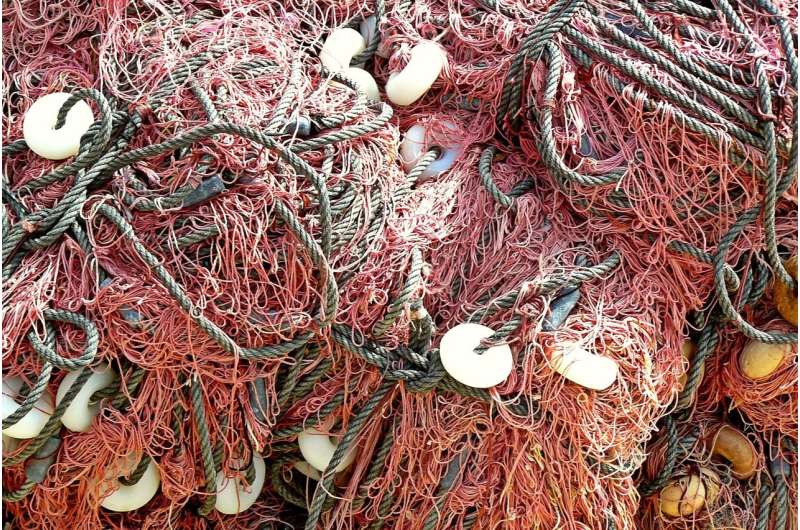
[ad_1]

Credit: Pixabay/CC0 Public Domain
Amid the mounting threats of a warming world, and with the latest annual United Nations Climate Change Conference (COP28) behind us, there is an important message that is often left out of the climate change conversation. Preventing overfishing is itself an effective climate action.
This argument is the logical conclusion of a number of studies that clearly emphasize that curbing overfishing is not just a necessity, it is an imperative for ocean energy, climate resilience and the livelihoods that depend on it. is a win for Sustainable fishing.
The complex relationship between climate change and Marine ecosystems It was the subject of a recent collaborative study—led by researchers at the University of British Columbia—that highlighted important links between overfishing and climate change.
Finding Connections
Our collaborative team of international researchers applied a range of methodologies, from literature reviews to quantitative and qualitative analyses. Results of This research Highlight eight key multidimensional influences.
1. End overfishing It is not just an environmental imperative but a critical climate action.. Doing so will strengthen the resilience of marine life to climate change and reduce carbon emissions.
2. Large subsidized fishing fleets can. Indeed, small-scale fisheries are burdened, making them disproportionately vulnerable to shocks. Consequently, overfishing not only depletes resources but also increases carbon emissions, Exacerbating climate impacts on these fishers and their communities, especially women.
Furthermore, The vulnerability of shellfish fisheries to climate stress further underscores the importance of adaptive strategies According to local conditions.
3. Success stories, such as the recovery of European hack stocks, Demonstrates a direct relationship between stock recovery and reductions in the intensity of emissions from fisheries.. We must be champions and learn from these successes.
4. Ecosystem-based fisheries management “changes the order of priorities so that management begins with ecosystem considerations rather than the maximum exploitation of multiple target species.”
Ecosystem-based fisheries management has considerable potential to increase sustainable catches while promoting carbon sequestration. It probably is. An excellent example of successful implementation of ecosystem-based fisheries management in the Western Baltic Sea.
5. Heavy metal pollution in the ocean—such as mercury or lead waste—accelerates the negative effects of warming and overfishing.. This pollution reinforces the need to develop multifaceted regulations around ecosystem and marine sustainability solutions.
6. Overfishing Increases threats to climate and biodiversity.. Climate change contributes to less defined and predictable seasons and is causing reproductive challenges and disease outbreaks in fish populations, among other problems.
Adding to these problems, Overfishing itself is changing ecosystem dynamics, altering habitats and opening new pathways for invasive species.. These complex crises exacerbate the impact of overfishing on marine ecosystems while at the same time Fish population High vulnerability to climate change.
All of the above factors combine to reduce the catch potential in any ecosystem. As a result, fishermen are forced to go further and deeper into the ocean to catch fish—increasing carbon emissions, personal risk factors for fishermen and to catch Concerns
7. International fisheries management should play a central role in promoting biodiversity and maintaining the carbon sequestration capacity of the ocean. While 87 countries have signed the UN Convention. Biodiversity of Areas Beyond National Jurisdiction Agreement (also known as the High Seas Treaty), only one has ratified it. The treaty should be fully ratified and its effective implementation should be dependent on the creation of marine protected areas covering at least 30 percent of the high seas.
8. The ocean has a large potential for carbon sequestration. A shift from generally accepted maximum sustainable yield management to maximum carbon sequestration in fisheries management can further advance climate goals..
Future regulations should allocate a percentage of the annual fish quota to maintain the carbon sequestration function of marine animals. Simply put, apart from being just food, fish stocks serve important functions. Carbon recovery and biodiversity services that directly benefit humanity. Future regulations should reflect this fact.
A simple goal
This joint collaborative research underscores the urgency of this problem. Ending Overfishing It is not just an environmental imperative but a linchpin for climate action. Furthermore, fisheries are not mere victims in these dynamics, but are the real agency in playing an important role in exacerbating or mitigating climate change.
An ideal governance framework would focus on considering ecosystems for their diverse benefits, based on the best available evidence. Fisheries regulation, while controversial, is necessary to avoid overexploitation of such a valuable public resource.
As we prepare for the next COP, we would do well to remember these results. Without nurturing marine life, tackling climate change becomes an uphill battle. Sustainable fisheries management is not just an environmental imperative. It is also the foundation for a resilient, sustainable future.
Provided by
Conversation
This article has been republished. Conversation Under Creative Commons License. read Original article.![]()
Reference: Eight Ways Stopping Overfishing Will Boost Biodiversity and Help Combat Climate Change (2024, February 18) https://phys.org/news/2024-02-ways February 18, 2024 Retrieved from -overfishing-biodiversity-climate.html
This document is subject to copyright. No part may be reproduced without written permission, except for any fair dealing for the purpose of private study or research. The content is provided for informational purposes only.
[ad_2]


